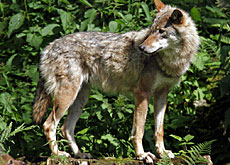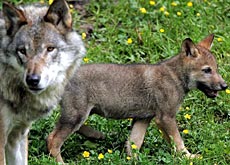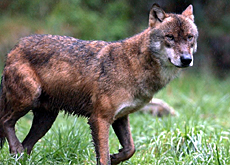Wolf culling shot down by Strasbourg

Switzerland has failed in a bid to downgrade the protection status of the wolf, which would have allowed the animal to be culled in Europe.
The standing committee of the Bern Convention on wildlife protection rejected a Swiss request to have the wolf reduced from “strictly protected” to “protected” at a meeting in Strasbourg.
Conservation groups, which had criticised the move as “pointless and unjustified”, welcomed the decision and called on the Swiss government to rethink its protection strategy for threatened species.
Monday’s decision comes less than a week after a wolf, reported to have killed around 30 sheep, was shot dead in canton Valais. It was one of only around half a dozen wolves in Switzerland.
“We are very, very happy that Europe has not yielded to pressure from Switzerland,” Nicolas Wüthrich, spokesman for conservation group Pro Natura, told swissinfo.
“If the Swiss had succeeded it would have given the false impression that the wolf is widespread and that there is less need for protection.”
In rejecting the Swiss application, the committee argued that there was already sufficient provision under the treaty for dealing with any problems that wolves might cause.
Hunting ban
The Federal Environment Office, which submitted the request on behalf of parliament, defended the move, saying there was never any question of allowing the wolf to be hunted.
Christoph Jäggi from the hunting and wildlife department told swissinfo that it was simply a question of allowing controlled culling in order to maintain a manageable population level.
“It’s not like we do not want the wolf in Switzerland. We just want to have the possibility to manage the animal in a way that protects the wolf population in the Alps,” he said. “There is no question of making this species huntable again – not at all.”
Jäggi pointed out that when the convention was signed more than 25 years ago, it was never foreseen that the wolf would return so quickly to western Europe, where it was driven to extinction a century ago.
And while there are only four known wolves in Switzerland, which are part of the alpine population – two in canton Valais and the others in cantons Graubünden and Ticino – he said it made sense to change the status now.
“We want to be prepared for when the population really spreads into our country,” said Jäggi. “We have very strong indications that the population from Italy and the French Alps is reproducing very close to Switzerland – and we assume that there are 200-300 wolves already living in the Alps. Therefore, it is only a question of time before there will be reproduction in Switzerland, too.”
Review national strategy
But Pro Natura said that rather than looking to change the wolf’s strict protection status, the government should rather be re-examining its “Swiss Wolf Project”, drawn up in 2001.
Regulations revised two years ago permit the shooting of any wolf believed to have killed at least 35 sheep over a four-month period, or 25 in a single month.
But Wüthrich said the strategy was never conceived to take account of an expanding wolf population. He added that all interested parties now needed to sit down and address this issue.
He said Switzerland was out of step with the policies of some of its neighbours, claiming that the recent wolf shooting had not gone down well with the Italian authorities.
The environment office said on Monday that it planned to review its wolf management strategy over the winter and to work more closely with France and Italy to manage the wolf population in the Alps.
swissinfo, Adam Beaumont
Wolves were driven to extinction throughout most of western Europe by the start of the 20th century, largely by hunting and the expansion of human settlements and upland farming into areas in which they had ranged free.
But over the past few decades, partly as a result of the Bern Convention, some have returned to the Alps – stretching from France across northern Italy and Switzerland to Austria – with the help of conservationists.
Single animals returned to Switzerland from Italy in 1995. The penalty for illegally killing a wolf is up to one year in prison and a fine.
The Convention on the Conservation of European Wildlife and Natural Habitats was adopted in Bern in September 1979.
45 countries are party to the legal instrument, also known as the Bern Convention, including members and non-members of the Council of Europe.
Under Article 9 of the convention, “strictly protected” animals that cause extensive damage to livestock or threaten public safety can be killed.

In compliance with the JTI standards
More: SWI swissinfo.ch certified by the Journalism Trust Initiative


You can find an overview of ongoing debates with our journalists here . Please join us!
If you want to start a conversation about a topic raised in this article or want to report factual errors, email us at english@swissinfo.ch.